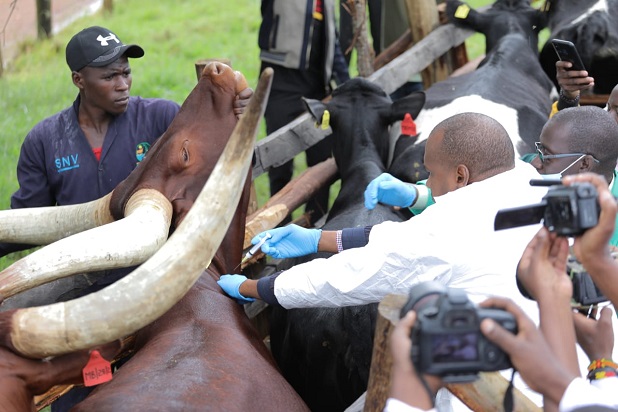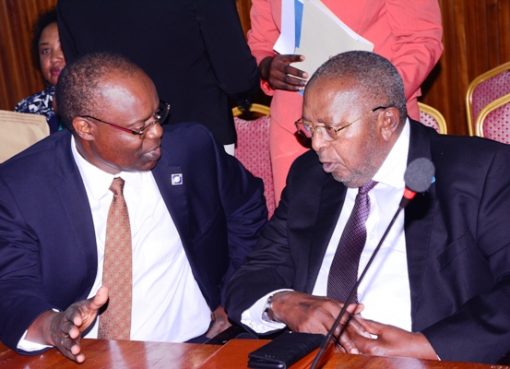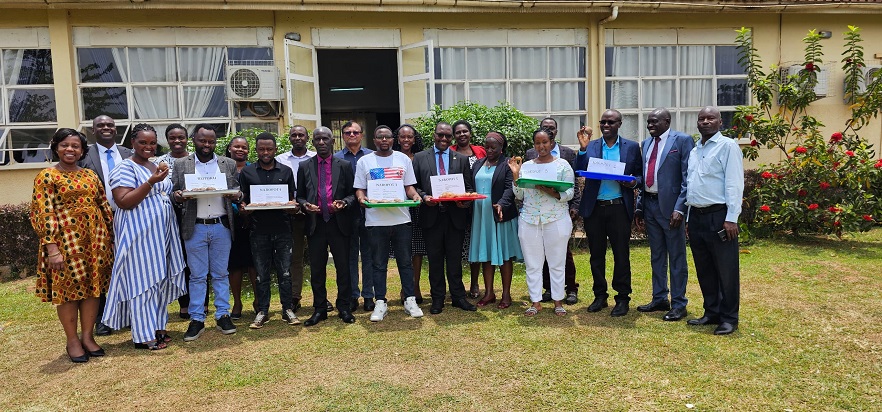Minister for Agriculture, Frank Tumwebaze administers the first anti-tick vaccine for field trials at MBAZARDI
Scientists and politicians Thursday afternoon convened at Mbarara Zonal Agricultural Research and Development Institute (MBAZARDI) in Mbarara to launch the Final Field Trial for Ugandan made anti-tick vaccine.
The vaccine was developed by scientists at the National Agricultural Research Organisation (NARO).
The Vaccine efficacy currently stands at 88% compared to 50% required before commercial production.
With its development started 10 years ago, scientists are confident that the trial will evaluate areas of safety, efficiency and that the animals will not be sprayed.
The other innovation is an oral suspension. This is in comparison to previous vaccines that required spraying twice a week. However, according to Dr. Yona Baguma, the Deputy Director General – Research Coordination at NARO, the new development will require the farmer to spray twice in six months (once in three months). This, he says will make the farmer realize more money; reduce on acaricide chemical contamination of the environment and food.
He added that exports of beef and milk will be more acceptable to lucrative markets as a result of reduced chemical and drug residues. Once the trials that are expected to take one year across all ecological zones become successful, this will mean that the government will have to concentrate on commercial production. It will also save the government from the burden of importing vaccines. According to Dr. Baguma, the government spends between Shs2.8 trillion and 3.8 trillion on anti-tick vaccines per year. According to Dr. Swidiq Mugerwa, the Director at National Livestock Resources Research Institute (NaLIRRI), 90% of components of the innovation are locally sourced.
This means that only 10% is imported. Ankole Parliamentary Group Chairman and Nyabushozi County Member of Parliament, Wilson Kajwengye, described the innovation as the “best news ever.”
This, he says, is because Nyabushozi is the host of 500, 000 heads of cattle. The Permanent Secretary, Ministry of Agriculture, Animal Industries and Fisheries, Maj Gen Kasura Kyomukama however warned against early celebration.
He says the outcome of the field trial will inform the next course of action.
He congratulated NARO saying that even if the trial does not register a success, that failure is in itself a success. While he appreciates the current budgeting, Kasura decried the lack of enough funding that goes into research. He says that research is the only solution to problems in marketing the country’s products.
His argument is that once there is adequate funding in the sector, then challenges of ticks and FMD (Foot and Mouth Disease) will be history and make it easy for Uganda’s meat and milk to be marketed and accepted on the market.
The Chairperson Parliamentary Committee on Agriculture, Janet Akech Okori-Mo pledged total support to NARO in terms of advocating for more money for research.
“We have seen the evidence. You will get more money,” Akech, who doubles as Abim Woman MP, said.
According to the State Minister in charge of Animal Industry Bright Rwamirama, the livestock sector contributes 17% (4.7 billion dollars) to the Country’s GDP. The sector, he adds, employs over 10 million people and that the sector provides food and nutrition security.
He however said the sector lacks enough money (gets only 2% of the country’s budget) and as a result faces a number of challenges, including 30% calf mortality as a result of ticks.
Because of ticks, he adds that the country loses US$ 473 million in meat production (because it is not accepted on the international market) and that the government spends US$ 83.3 million on importing drugs per annum.
On diseases, he says while Uganda tries so much to fight diseases, some East African Community countries such as Tanzania, South Sudan and DR Congo have not been cooperative in terms of fighting the diseases because the policies are not harmonized. He, however, revealed that the matter is being worked on.
Rwamirama described the innovation as a big “milestone” adding that prevention is better than cure.
“We must support research in this country,” Rwamirama said, appealing to farmers to treat farming as a business and take very good care of the animals.
The Minister for Agriculture, Frank Tumwebaze, commended the team for the job well done and noted that the research links directly with the farmer (influences how the farmer does his or her work on the farm). He pledged that the government will give NARO more money that they require. He, however, suggested that there is a need to discuss the innovation’s sustainability. Tumwebaze described the innovation as “good news for livestock development.”
“We shall support you with the policy framework,” Tumwebaze told NARO.





